Book II, Chapter 22: Horror in Cronenberg!
List of Chapters | Previous Chapter
The conflict that journalists were beginning to refer to as the Franco-Prussian War was coming to an end (if it had not ended already) and a black cloud of unease and disgust now brooded over the states of the North German Confederation. Benedikt, a former schoolmaster, called the feeling everyone was experiencing fastidium: “It’s the old Roman word for that sense of squeamishness and revulsion that gums up the bowels, sours everything sweet in one’s life, and makes each successive day seem more a bane than a bounty from God.”
Even the highwaymen who made their living waylaying unwary travelers crossing over the border from France felt it prudent to withdraw into the comparative security of the walled towns, fearing they themselves might be robbed by roving bands of demobilized soldiers marching home from the front.
A mixed delegation of military and civilian personnel had come up from Kohlendorf on 4 January 1871 to collect the effects of the five men murdered at the Meyer Farm the previous December.
Under the shifty eyes of that shiftless inspector whom Hermann had met before, the delegation returned whence they had come, taking with them the battered but still operable diligence (property of a coach company in Cronenberg) laden with the strong box of money (property of a bank in Lübeck) and the bundles of mail recovered from the scene of the crime (property of the Prussian Crown).
The story of the life and death of Frater Melchior von Mariahilf am Inn had been too much for Hermann to take in; and a month later he was still reeling from the many revelations Benedikt had disclosed to him over the course of several weeks in December. He needed time to reconstruct the scattered tesserae of this elaborate mosaic in his mind, so that he could reflect upon it before formalizing whatever questions he still had.
To economize on the firewood (and at the insistence of Herr and Frau Eltzbacher), Monika, Benedikt, Hermann, and the orphan boy Walter had vacated the carriage house and moved into the more snug accommodations of the the Eltzbacher Coach Inn, considering the establishment had not hosted any new guests since the new year had begun.
Walter complained that his pet cat, Mürrisch, would freeze to death if left alone in the clapboard building out back, which spurred Elischewa, after an overly dramatic show of being chuffed by the matter, to relent and tell “Florian” (the only name she knew him by) that he could keep the cat in the coach inn on the condition it remain locked in her office near the staircase in the common room.
“I don’t want it clawing the curtains or chewing the furniture upstairs.”
“Thank you so much, Frau Eltzbacher!” Walter said, throwing his arms around her waist.
“Let me breathe,” the proprietress grumbled. But everyone could see she was touched by the gesture. “Another thing,” she added. “In the spring you and your father will need to remove the floorboards in the office and replace them, because no matter how hard you scrub, the cat’s urine will have seeped into the wood.”
Elischewa’s tambour desk and swivel chair were removed from the office, along with her papers, ledgers, and writing instruments. The desk now stood flush against the staircase.
It was 6 February 1871 and the six souls occupying the central table of the common room were finishing up their hearty supper. Abner praised Monika’s Leberknödel soup, dabbing the juices in the bowl with a crust of rye. The Saxon woman acknowledged the compliment with a faint smile, rising to collect the dishes.
Hermann and Benedikt echoed the old man’s remarks but exchanged significant glances, because the growling of the cat behind the office door did not sound feline. Walter gathered up the table scraps and quietly slipped into the office, at which time the noise mellowed into a silky mew.
An hour later, the boy was snoring and a steady purr could be heard coming from the crack under the door. Walter had determined that if he could not sleep with Mürrisch upstairs, then he would bed down with the mangy cat on a bolster next to an iron pan, which Monika filled with coals and slipped into the office each night before heading upstairs to the room she and Benedikt shared.
With the boy asleep, the five adults settled into what had become a nightly routine of domestic conviviality and ease.
Benedikt stood at the hearth across from Abner, who occupied one of the wing-back chairs near the fire. The two were pulling alternately on Abner’s meerschaum pipe, the bowl of which, shaped like a Turk’s head, had begun to yellow. They discussed whether the war with France was moral; and, if not, what moral could be learned from it.
Monika and Elischewa sat together at the far end of the long table, patching a tear in Hermann’s coat. Elischewa wore a black snood and a pair of wire rimmed spectacles on the tip of her nose. She claimed she did not need them when reading, writing or computing; only when doing fine needlework.
Hermann, at the opposite end of the table, flipped through a crumpled-up miscellany he had found in the magazine rack by the coal bin, which combined the educational qualities of an almanac with the unmitigated rubbish of a penny dreadful. This edition had been published in Cologne at the end of November last year.
He had just finished reading about the techniques for scraping sweat from horses, something he had not known how to do before Benedikt had taught him. The article concluded with a half-page advertisement for the tack shop in Kohlendorf run by Elischewa’s brothers.
When he came to the meteorological section, there was a separate column (boxed in tracery) devoted to the upcoming phases of the moon. It mentioned the eclipse that had—way back in November—been predicted to take place on the 22nd of December. He unconsciously nodded to himself. Neither he nor Benedikt had witnessed the event that day, due to the gray cloud-cover. But they had both commented on how the afternoon light had seemed eerie and slightly off.
Hermann thought of the beautiful opera singer from Bavaria, Heidi Katherina Dautzenberg, and how it was she who had told him about the eclipse. He touched his lips and grinned, recalling the kiss she had given him beneath the mistletoe at the castle ruins that very night.
When he looked up, Elischewa was staring at him over her spectacles.
“What?” she asked.
“Nothing,” Hermann replied, embarrassed. “Did you know there was a solar eclipse on 22 December? That’s why the sunlight was unusual that afternoon.”
“Who cares?” Elischewa said, pulling a thread through the fabric. “Moritz, why are you reading expired star charts? Please tell me you’re not a horoscopist.”
He could tell her that with absolute conviction since he didn’t know what the word meant.
“Monika,” Elischewa said, “could you please prepare Abner’s sleeping draught? It’s his bedtime.”
“Of course,” Monika said, as she placed the spool of thread on the table before rising and disappearing into the kitchen.
“The sleeping draughts don’t help,” Abner said, smiling up at Benedikt. “I still see the man in my dreams.”
Elischewa removed her spectacles. “Abner, don’t. . .”
“What man?” Benedikt inquired.
Abner handed the ostler his pipe. “He’s not really a man. More like a wolf pretending to be a man. In the dream, I’m sitting in my rocking chair in the cottage, facing the window. It’s nighttime and he’s standing outside, looking in through the frosty panes, because it’s winter like now. . .
“He’s shaggy and has one eye, like the cat in the office over there. In the socket where his other eye should be, I see an orb of pulverized glass. Somehow, he whispers into my ear, saying, ‘I chewed up the glass to make a glass eye; and also because I find the taste of glass delicious.’”
“Wahnsinn (insanity),” Elischewa said, tapping her right temple. “His mind is going, you know?”
Hermann kept his eyes on the magazine, because he knew Benedikt was looking at him.
Monika could be heard putting the kettle on the cast-iron stove’s hottest burner—not to boil the water, but to warm it for the powdered drug.
Hermann turned the page and his mouth fell open. A frisson of panic ran up his spine when he read (stamped out in gothic Fraktur script): HORROR IN CRONENBERG!
There was a pen-and-ink illustration of him in profile with a mustache. It was an accurate representation, labeled: “The murderer Hermann Tischler”.
He glanced up to make sure no one was looking at him. Abner and Benedikt had resumed their conversation, although the ostler was now impatiently fidgeting. Elischewa had taken up the spool Monika left and was drawing out a skein.
He read the article from the beginning. . .
The peace and tranquility of Cronenberg’s Arbeitsquartier (work quarter) was shattered on All Saints’ Eve, when a denizen of the Schorn Foundation, a former industrialist of good repute, Hermann Tischler, murdered and mutilated the corpse of his catatonic wife, Henriette Tischler (née Landecker).
The once prosperous couple had suffered a great reversal of fortune on Holy Saturday, 1867, when their three children (and the poor woman’s parents) were massacred at the same location, in front of the Cronenberg Tar and Creosote Factory. This fresh atrocity now casts doubt on what was once believed to be Herr Tischler’s manifest innocence of that crime.
Imagine the scene! Baroness Greta Schorn, the Dove of the Wuppertal, enters the apartment of her lodger. Before her astonished eyes, lies bare the gory relics of the long-suffering wife, torn limb from limb by her own husband, who stands in a nightshirt spattered in blood. Smilingly, the madman asks his benefactress if it is not a pretty sight she now gazes upon.
But the veteran nurse of the war in the Crimea coolly informs the beast that he must cleanse himself and prepare to stand before the bar to face the consequences of this outrage. Swiftly she leaves the bloody chamber to alert a soldier of His Majesty King Wilhelm that a gross violation of the laws of God and of the land has been committed on the Foundation’s premises.
But the murderer has already plotted his escape.—And he has an accomplice!
“I long knew the boy Walter was no mere orphan, but a child of the Devil,” claims one of the laborers. “He was often seen chewing gleefully the chopped-up remains of dead pigs; and sometimes he smeared himself in the animals’ ordure to annoy the men with whom he bunked and worked.”
Another witness: “On moonlight nights, the boy was often seen disporting himself in the common yard beneath Luna’s mellow beams. When asked why he acted so peculiarly, he would say, ‘I dance for my master Satan.’”
Here, was a second illustration—of Walter. But this image (with its gimlet eyes and wild hair) bore no resemblance to its original.
On the next page, he hung his head and sighed. Here he learned that Eva, the young girl who had watched over Henrietta and tended to her in her final days, had been driven mad by what transpired at the workhouse that night. In a heart-wrenching illustration the girl was depicted supine on a bed surrounded by policemen. According to the narrative, she encountered Hermann fleeing the workhouse, which was true.
Together, the girl and the murder glance up at the second-story window of Block 1, where the malefactor has lodged for over three years with his wife. In an access of terror, Eva locks eyes with the child Walter, who is smiling down upon her from the windowsill of that very candlelit room! The door opens. Rolf, her husband, enters and stands aghast at the vision that swims before his eyes.
He approaches the foundling, believing the child to be an innocent in a equal state of sympathetic shock. But, with the reflexes of a viper and the strength of a rhinoceros, the boy demon attacks this same man who ought only to succor him. Gentle reader, the devil child rips the young man in half! And before she even know she is a widow, the young Eva collapses in a swoon into the eager arms of the godless fiend, Hermann Tischler.
The werewolf had indeed been born again that night out of Henrietta’s bowels—not out of her womb. For in the wake of the murder of her children, and without Hermann’s knowledge or consent, a surgeon from Hamburg had concluded that the only hope there was of rousing the insensible woman from her state of perpetual shock and nervous collapse would be to perform a hysterectomy.
The second most horrible day of my life after the murder of my children—of our children. Oh, Henrietta!
Vividly he recalled the leering infantile face at the window. As he contemplated the grotesque illustration in the magazine that did not do justice to the Devil as he had appeared to him that evening, Hermann turned over in his mind Abner’s recurring dream of the wild man in the window with the eye of crushed glass. It all seemed to tie together. It was a message. The demon had followed him to the Eltzbacher Coach Inn now. It was tormenting him, letting him know that it had never gone away.
Hermann planted his elbows on the table; and, bracing his head between his hands, read the story to its end.
With Eva in his arms, the fugitive dashes across the river Wupper and finds a secluded place behind a factory out building, where, despite the alarms having sounded, he finds the time and the means to grossly abuse her! Although the ravished insane woman still lives, and has thus far shown no signs of being in a motherly way, she raves that she shall one day bring forth an evil seed sired by a werewolf!
But what has become of the culprits?
Hermann Tischler and the child monster Walter fled north across the slime pits and have not been seen since. The man is of Austrian descent and speaks German with a provincial southern accent. The child is between nine and eleven years of age. If you have seen them or know of their whereabouts, notify Prussian authorities immediately, so that no more lives are lost.
Hermann rolled up the magazine so that he could burn it later. The inspector from Kohlendorf didn’t recognize me, but he must have to put two and two together and assumed there was a connection between the incident at the Cronenberg workhouse and the murder of the five men south of here. I should leave this place—leave the boy here. He’ll be safe. Benedikt will teach him to be a man. Monika will raise him as her own.
No sooner had he thought of Monika than she returned from the kitchen and placed the mug with the sleeping draught on the table. She was about to resume her seat, when she froze where she stood.
“My dear, what’s wrong?” Elischewa asked.
The ostler’s wife raised a trembling finger and pointed at the curtain to the left of the door.
It was a bright winter night; and something shaped like a man was casting a shadow upon the thick curtain, as if someone stood at the window looking in. But the person would have had to have been at least seven-feet tall; and it could not have been cast by any of them in the well-lit common room.
Slowly, the shadow tilted its head and everyone gasped. Benedikt ran to the entrance as the shadow merged with his own. Just before he flung open the door, the photograph of the Eltzbachers’ son, Joseph, fell from the wall.
The ostler stepped outside; and, when he returned, shut the door quietly so as not to wake Walter. But it was too late. The orphan had already slipped out of the office. He stood with his back to the wall, rubbing his eyes. The cat did not try to flee but remained in the dark, its one eye glinting in the firelight like a glass bead. The eye was fixed on Hermann.
“What happened?” Walter asked.
“Nothing,” Benedikt said. He informed everyone that he had seen no prints in the snow, and that there was no one outside as far as he could see. “It was just a trick of the light.”
Abner rose from his seat and picked up the photograph. It was a framed ferrotype of Joseph in his Prussian uniform. He put it back on the nail. This done, he beamed at Walter. “The boy looks like Joseph. Don’t you agree, my love?”
“Yes,” Elischewa said. “He would’ve been forty-five today.”
“When did he pass?” Monika inquired.
“Christmas Day, 1860.”
Abner shook his head. “He was murdered. . .”
Everyone went quiet. Hermann stood up. Walter went to him.
Elischewa compressed her lips for a long while; then looked up at her husband. “What did you say?”
Abner wiped a tear from his eye. “My mind is going. You said so yourself. . . I don’t need a sleeping draught tonight. I just want to go home.”
Elischewa stood up and went to Hermann, carrying his coat in both hands. “This has been mended. Please take my husband back to the cottage and see that he is put to bed.”
“Goodnight,” Abner said as they left.
No one answered.
Hermann led him gingerly over the icy flagstones. When they had reached the door, the sad old man kissed his fingertips and touched the mezuzah.
The master bedroom was located at the end of the narrow hall. When Abner had crossed its threshold, he turned and gently patted Hermann’s forearm. “Thank you for your help. I’m not yet so doddering as to be unable to put myself to bed.”
Hermann nodded and walked back down the hall. Quietly, he heard the bedroom door click shut behind him. In the front room, he glanced from the rocking chair to the window.
When he had returned to the inn, Walter was back in the office and the door of was shut. The boy was undoubtedly listening in. He’s a child of the streets. It’s his nature.
Elischewa was contemplating the photograph of her son. Monika went to Benedikt, who placed his arm on around her waist. Without taking her eyes off the photograph, the proprietress spoke.
“Can Wellington still pull the chaise coach?”
“I believe so. Yes. Why?”
“I want to see my brothers. I need to go to Kohlendorf tomorrow before daw—” She broke down and began to sob. Monika went to her.
When she had regained her composure, she gently pushed her assistant away. “I will stay no more than two nights. Benedikt and Moritz, I need you both to come with me. It is only a 10-mile journey; but this is a bitter winter, and if there is a mishap along the way, it could prove fatal to me with only one man in attendance.”
Monika wrung her hands. “That will leave me here alone with Florian and Herr Eltzbacher.”
Elischewa paced back and forth. “I shall draft a letter to Herr Schuster before I leave, requesting him to post guards around the inn. Florian can deliver it to the Bürgermeister at daybreak. The guards shall have strict orders not to enter the building when you are alone inside so as to ensure there is no whiff of scandal.”
Monika lowered her eyes. “As you wish, Frau Eltzbacher.”
Elischewa went to the hook at the door and grabbed her shawl. Before exiting, she addressed them over her shoulder. “Please swear to me that you will not discuss, even among yourselves, what Abner said this evening.”
“You have our word,” Benedikt said on behalf of them all.
Hermann was unable to fall asleep that night until just before it was time for him to rise. But he had managed to burn the magazine in the hearth before putting out the fire for the evening and going up to his room.
Benedikt nudged him awake. Hermann sat up in a panic.
“It’s time,” the ostler said. His boots sounded on the boards as he withdrew in the pitch-black room.
By the time Hermann descended the stairs, with a haversack full necessaries slung over his shoulder, Elischewa was at the tambour desk, putting the finishing touches on the letter by the light of a guttering candle.
Monika handed Hermann a lantern and told him that Florian was out back helping Benedikt hitch up the two-wheeled chaise.
As he exited out back through the kitchen door, he heard Benedikt swearing at “Vellington” to calm down.
“I don’t know what the hell is wrong with him,” Benedikt grumbled. “It’s as if he doesn’t know how to back up.”
“Did you feed him?” Hermann asked.
“Of course.”
After struggling with the stallion for nearly half an hour, they managed to get him hitched up to the carriage. In the meantime, Walter had been greasing the axle, since the chaise had not been used in years.
“Are you going to put a saddle him?” Walter asked, climbing out from under the carriage.
“No,” Benedikt frowned. “He’s in harness and already bucking against the carriage. I don’t want to distress him further by throwing a loose saddle on his back.”
Benedikt led Wellington by the reins to the front of the inn, where Elischewa and Monika stood waiting for them on the stoop. The chaise was uncovered, but Monika and Hermann went back inside and came out with armfuls of blankets, which they gave to Elischewa.
“Too many,” Elischewa said, handing three back to Monika.
Abner was nowhere to be seen. But Hermann noticed there was a candle burning in the cottage window.
The moonlight on the snow made the landscape surprisingly lucent beneath the cloudless starry sky. Hermann walked in front of the horse with the lantern raised to light the way. But as his eyes grew accustomed to the dark, he began to feel that the lantern’s light was (on this occasion) gratuitous, especially considering that Benedikt had eased the wheels of the cart into the ruts, which, although making the journey bumpy for the passenger, kept the carriage on the road.
As they reached the Meyer farm, Hermann stopped and squinted at what he saw. He turned to look at Benedikt, who seemed equally puzzled. This was the stretch of road where the coach carrying the four bankers from Lübeck had been attacked. It was also the place where the two of them had waited on horseback for the delegation from Kohlendorf to arrive. Before them was the same phenomenon that he and Benedikt had witnessed on that foggy winter morning at dawn.
There was an uncertain figure standing at the edge of the road, swinging a lantern. What made the apparition unnerving was that its movements mirrored Hermann’s own.
Elischewa did not see it, because her face was muffled up against the wind. As the carriage drew nearer, Hermann and the ostler both exhaled a sigh of relief. It was, in fact, a man—a farmer by the looks of him. He had evidently been swinging the lantern in response to Hermann’s movements as a kind of joke.
“Good morning,” Benedikt said.
“Good morning,” the man answered. “I’m afraid you horse’s days are numbered.”
“What do you mean?” Elischewa asked, lifting her head.
“He has shivers.”
Benedikt curled his lip in a sneer. “What in the world makes you think he’s got shivers?”
“I have an eye for such things,” he replied, raising the lantern to reveal a bearded face with a patch over his right eye. “Notice: I said ‘an eye’, since I no longer have two.”
The flame in Hermann’s lantern went out. Benedikt stopped the carriage. Wellington snorted in protest.
“The lantern is out of oil,” Hermann muttered.
He went to the supply box at the back of the carriage to refill it. When he was done, he reached into the haversack, looking for the matchbox.
“Will you allow my man to kindle his light by yours?” Elischewa asked.
“A rather philosophical proposition, Frau Eltzbacher.”
“You know my name?”
“Of course I do. Everyone round here knows of the Eltzbachers and their coach inn.”
“You have me at an advantage, Sir. What is your name?”
“My name? It is a number. And I do not freely part with it.”
“Too early in the morning for riddles,” Elischewa said. “Good day, stranger.”
“Wait!” the man said. “Your servant is free to kindle his light by mine.”
“Very well,” Elischewa said. “Moritz, light your lantern and catch up with us when you’re done. Benedikt, let’s go.”
Benedikt clicked his tongue and Wellington began to move.
Hermann crunched through the snow toward the man, as he produced a paper from his pocket to transfer the flame with.
“She called you Moritz,” he said,.
Hermann did not reply.
“Since you have a free hand,” the stranger said, “could you please unlatch my lantern’s globe.”
Hermann did so, and then opened his own. The man thrust the paper inside to catch the flame. Removing it, he inserted it into Hermann’s lantern, moaning obscenely as the fire licked the oiled wick. “Mmmm. . .”
Hermann was so revolted that he shut the latch and stomped away without so much as thanking him.
“Little boy, little boy,” the man said in a woman’s voice. “Remember what I told you.”
He stopped dead in his tracks; and looked tremulously over his shoulder. The man lifted his eyepatch, revealing a ball of pulverized glass wedged into the right socket. Hermann ran as fast as he could in the heavy work boots, but slipped and almost fell on the ice.
When he had righted himself, he wheeled round and beheld a curtain of snow fog close over the man. When it had drifted away, the figure was gone. And the only flame burning as far as the eye could see was the borrowed one in Hermann’s upraised lantern.
I would like to thank
for her assisting me on the issue of horsemanship in the 19th century. From personal experience she was able to provide me with a lengthy explanation on the nature of equine shivers and how it manifested itself in draft horses.

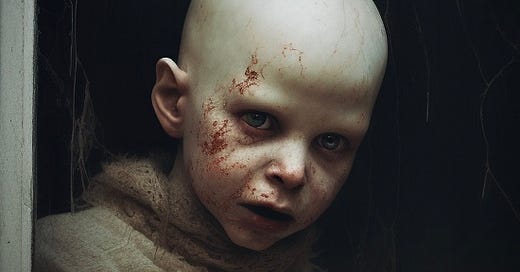




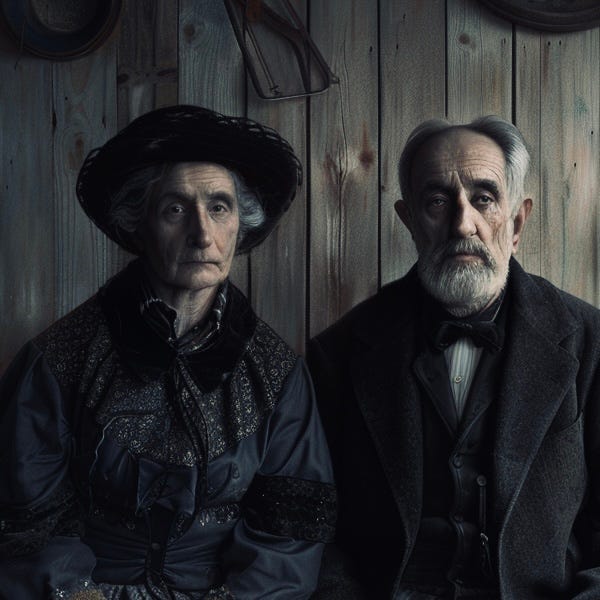
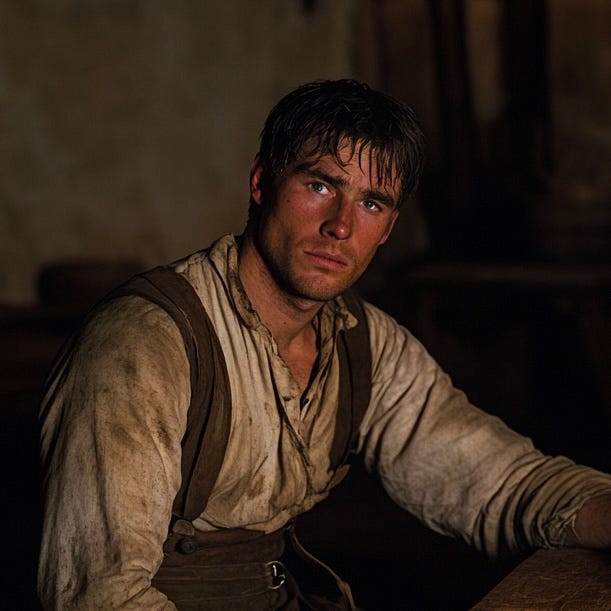

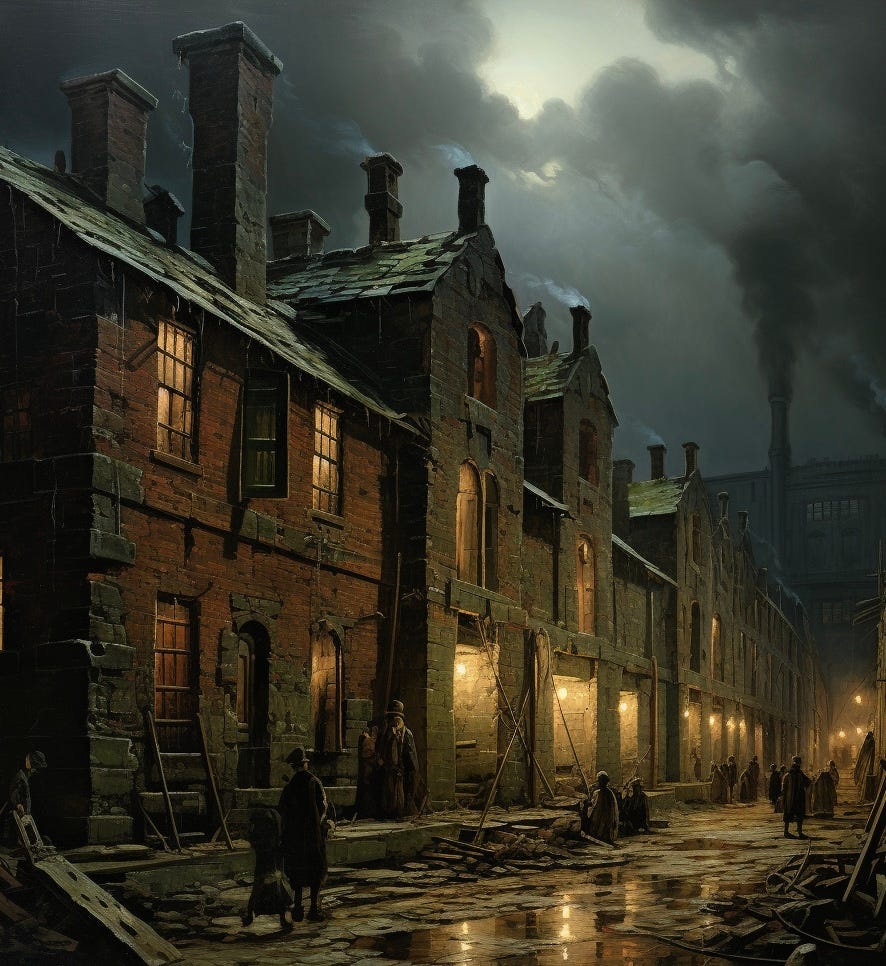


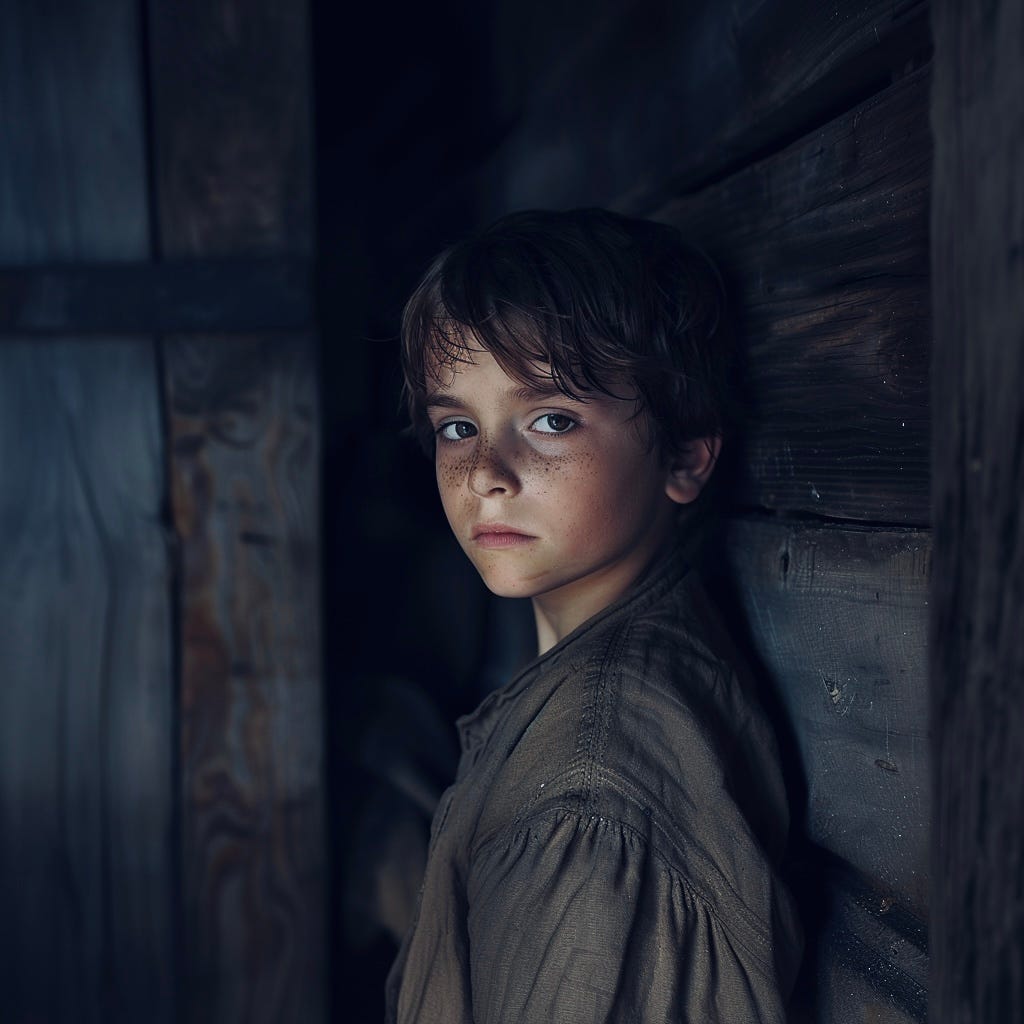
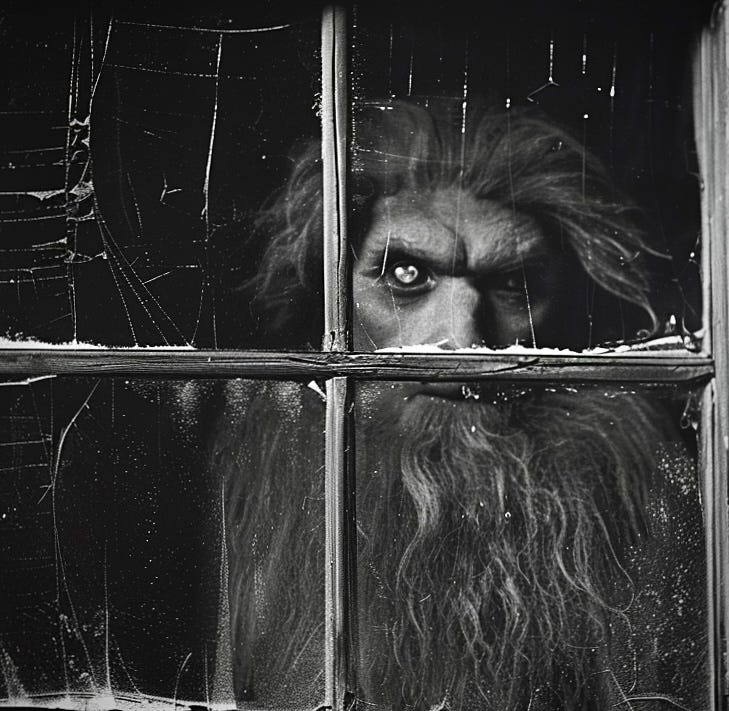
Great chapter! Finding the article about himself was quite hair-raising! And I love the equine element :-)
Great read thanks!